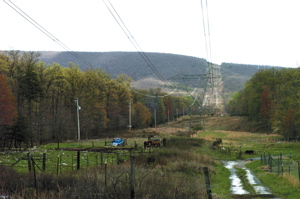Proposed Power Line Will Detract From Monastery's Tranquility
By Douglas Imbrogno, iStockAnalyst, July 27, 2008
Hampshire County, VA (USA) -- By Aug. 2, the state Public Service Commission will rule on whether to allow Allegheny Energy to start chopping a path for a new 500-kilovolt power line across 114 miles of the West Virginia heartland.
 This is the proposed Trans-Allegheny Interstate Line, or TrAIL.
This is the proposed Trans-Allegheny Interstate Line, or TrAIL.
I have a dog in the fight. For several years, I have been on the board of directors of the Bhavana Society, a Buddhist forest monastery and retreat center in Hampshire County. TrAIL has not dealt fairly with them.
The center was founded in 1982 by Bhante Henepola Gunaratana, author of "Mindfulness in Plain English" and other books. He is one of the most esteemed Buddhist teachers and meditation teachers in the West. "Bhante G," as he is known worldwide, longed to found a forest monastery while he studied for a Ph.D. at the American University in Washington, D.C.
He found land in a quiet niche of woods near Wardensville. Since then, Bhavana has become one of the leading Theravadan Buddhist centers in North America. It peacefulness and spiritual instruction attract people from across the globe.
It was a rather large surprise, then, to find the initial TrAIL power line routed directly across the eastern boundary of Bhavana's 50-odd acres of land, within a stone's throw of monks and visitors' cottages.
In the oldest tradition of Buddhist teaching, Bhavana exists entirely upon donations. No grants. No county, state or government funding. We thought long and hard about the cost of hiring a lawyer to go up against the squadron of attorneys brought to the table by TrAIL.
We found one, though we could not afford the $10,000 it cost to bring in a California expert to argue the dangers of electromagnetic radiation posed by such high-voltage lines.
Along all 114 miles of the line, homeowners and communities in six counties are undergoing similar grief and consternation, through Monongalia, Preston and Tucker counties, then across Grant, Hardy and Hampshire counties into Virginia.
The monastery is just one example, but it is a particularly puzzling one. Why would the company lay a huge power line right beside a Buddhist monastery? An existing right of way passes the monastery just a few miles down the road.
We have asked the State Public Service Commission to require the company to use an existing power line right-of-way down the road from Bhavana. We've asked them to "double-circuit" or place the new line atop the existing line for the short distance it approaches the monastery.
This was the solution to resolve an issue elsewhere on the line. Yet just last week, the monastery's vice abbot found a surveyor taking core samples for a tower beside Bhavana's property line. A junk yard owner adjacent to the center (through whose property the power company wants to site the line) has already received partial cash payment for putting the line there, we're told.
The staff and consumer advocate division of the PSC stridently opposed the line early on. They didn't buy the company's argument that it was needed. They abandoned their opposition after the company agreed to rate reductions, deferred rate hikes, a small re- routing, some jobs and low-income assistance.
The concessions sound good. But there is nothing to prevent the company from simply recouping those costs 10 years later in increased rates.
And let's consider the impact of the entire project, for a moment. The massive 500-kilovolt TrAIL line, entirely dependent on coal, poses an opportunity for the PSC. In a world fraught with fears over climate change, here is a chance - in a single vote - to begin moving West Virginia away from the carbon-based energy model that threatens the world.
In March, the PSC missed a chance to slow down West Virginia's race to yet more carbon-based energy. That's when they approved American Electric Power's $2 billion coal-fired plant in Mason County without requiring it to capture greenhouse gases, as they could have. The TrAIL case gives them a second shot.
TrAIL argues the line will prevent blackouts starting in 2010. Were the line not to be built, and blackouts kick in two years hence, I'll certainly eat crow. And in the dark.
But if no blackouts occur in 2010, and 2011, and 2012, 2013, 2014 and beyond, we'll know the company was blowing smoke on behalf of a for-profit venture described as "laying an extension cord" across the state to feed the East Coast's ravenous energy needs.
The Mountain State would once again serve as "a national sacrifice zone," in writer Harry Caudill's memorable phrase, on behalf of other interests.
If this line is built as the company wishes, the monastery will certainly be harmed by a 185-foot-tall power line crackling on its border. Any religious institution would be affected, but especially a forest monastery whose mission depends upon silence, solitude and a natural setting.
As esoteric as a Buddhist monastery in the West Virginia woods sounds, Bhavana represents what is best about life here: a peaceable place whose surrounding woods, waters and skies enrich the spirit.
I urge the PSC to vote down this line. But if they don't, I urge them to look out for the best interests of this special place in the back woods of the Mountain State and to reduce its impact on all landowners in its path.

 This is the proposed Trans-Allegheny Interstate Line, or TrAIL.
This is the proposed Trans-Allegheny Interstate Line, or TrAIL.